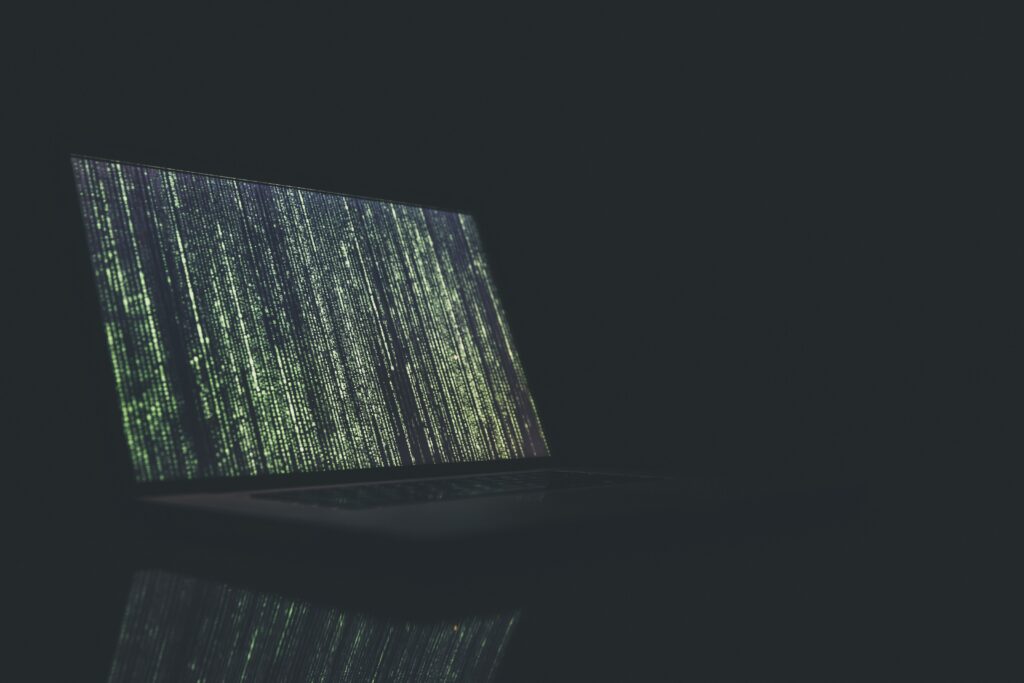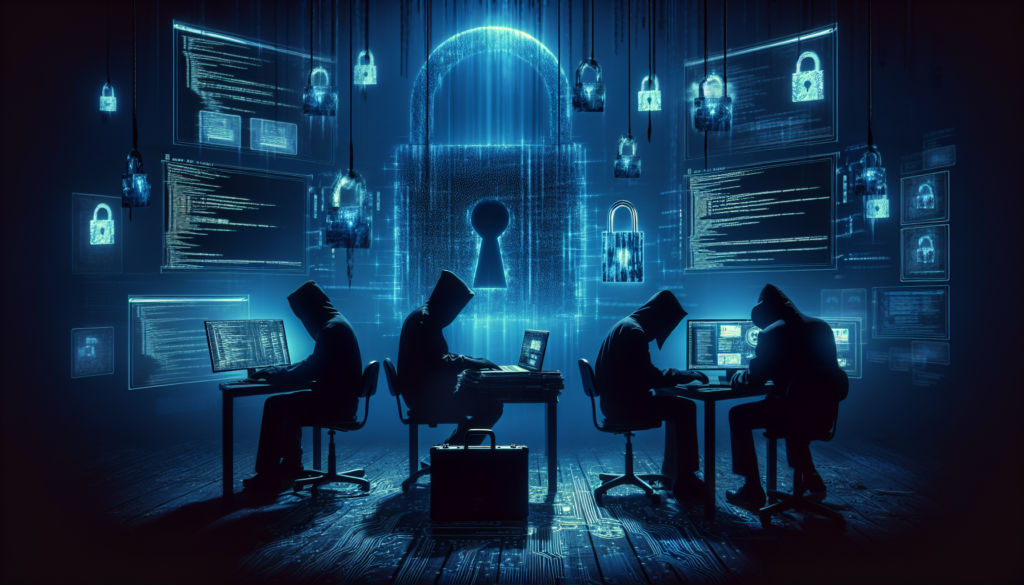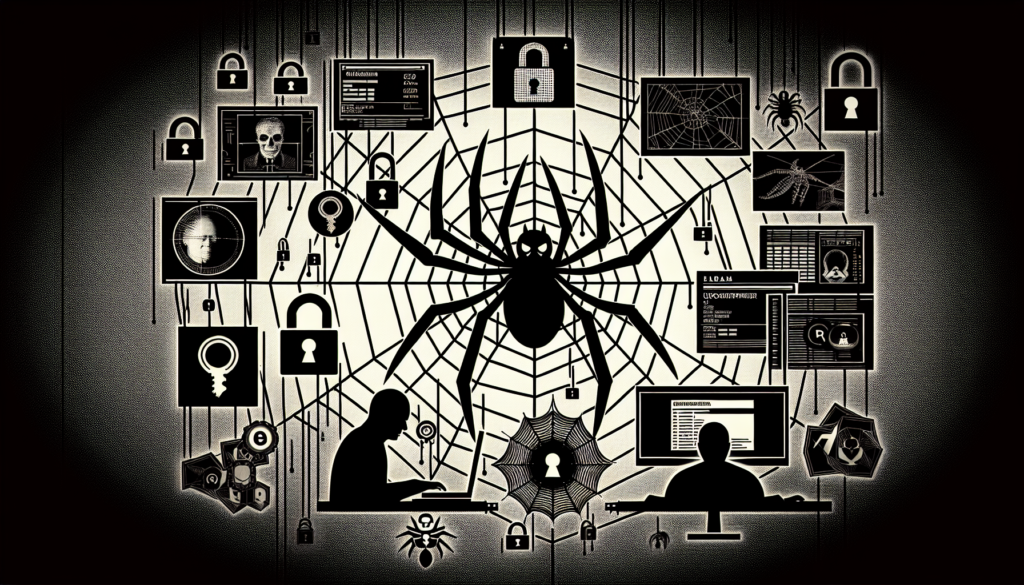In today’s digitally interconnected world, cybersecurity has become an increasingly paramount concern for individuals, businesses, and organizations. As we strive to protect sensitive information and safeguard against potential threats, the existence of dark web hacking services poses a menacing challenge. These clandestine platforms have emerged as a thriving marketplace offering illicit hacking services, raising serious concerns regarding data privacy and online security. Exploring the murky depths of the dark web hacking services unveils a dangerous landscape that demands vigilance and proactive measures to counteract this growing threat.

This image is property of images.unsplash.com.
Overview of Dark Web Hacking Services
Definition of Dark Web
The Dark Web refers to a part of the internet that is hidden and not accessible through conventional search engines. It is a realm of anonymity where users can engage in activities that are often considered illegal or unethical, such as buying and selling drugs, weapons, and stolen data. Dark Web hacking services are a subset of these illicit activities, where hackers offer their expertise and services to individuals or organizations seeking to carry out cyber attacks, gain unauthorized access to systems, or obtain sensitive information.
Introduction to Hacking Services on the Dark Web
Hacking services on the Dark Web involve a range of cybercriminal activities, including hacking into websites, social media accounts, financial systems, and even critical infrastructure. These services are often advertised on underground forums, onion sites, and private messaging channels, attracting clients who are seeking an edge in their illegal activities. The availability and accessibility of these hacking services on the Dark Web make it a breeding ground for cybercrime, posing numerous risks to individuals, businesses, and governments.
Risks and Dangers of Dark Web Hacking Services
The use of dark web hacking services poses significant risks and dangers to both individuals and organizations. By engaging with these illegal activities, individuals expose themselves to potential legal consequences, including severe penalties for participating in cybercrime. Moreover, utilizing hacking services on the Dark Web increases the chances of being victimized by cybercriminals, who may exploit vulnerabilities or use the gained information for malicious purposes. Additionally, the proliferation of hacking services on the Dark Web escalates the overall cyber threat landscape, resulting in potential damage to critical infrastructure, national security, and the economy as a whole.
The Dark Web: A Closer Look
Understanding the Dark Web
The Dark Web is a part of the internet that requires specific software, such as Tor (The Onion Router), to access. It operates based on anonymity and encryption, making it challenging to trace users and their activities. Users on the Dark Web rely on pseudo-anonymous identities and communicate through encrypted channels, ensuring their activities remain hidden from prying eyes.
Key Features of the Dark Web
The Dark Web is known for several unique characteristics that differentiate it from the surface web. First, it provides a high level of anonymity and privacy, safeguarding the identities of users involved in illegal activities. Second, it operates using cryptocurrencies, such as Bitcoin, allowing for untraceable financial transactions. Third, the Dark Web fosters a sense of community and trust among its users, with forums and marketplaces enabling seamless interactions and transactions. Finally, the Dark Web is often associated with illicit activities, including hacking services, drug trafficking, and human trafficking, attracting individuals with malicious intent.
Accessing the Dark Web Safely
Accessing the Dark Web safely requires adherence to specific precautions to maintain anonymity and protect against potential threats. Users should employ reputable Virtual Private Networks (VPNs) to mask their real IP addresses and ensure all internet traffic is encrypted. Additionally, they should utilize the Tor browser, which routes internet traffic through a series of relays, making it difficult to trace back to the user. It is essential to avoid clicking on unfamiliar links, as they may lead to malicious sites or expose the user’s real identity. Overall, users must exercise extreme caution to navigate the Dark Web safely and protect themselves from potential risks.

This image is property of images.unsplash.com.
Hacking Services on the Dark Web
Types of Hacking Services Available
Dark Web hacking services cater to a wide range of illicit demands, offering their expertise in various malicious activities. Some of the common services include hacking social media accounts, website or database breaches, distributing malware, conducting DDoS (Distributed Denial of Service) attacks, and selling stolen data, such as login credentials and credit card information. These services are sought after by individuals, criminal organizations, and even nation-states to carry out cyber espionage, gain financial advantage, or target specific individuals or entities.
Popular Dark Web Hacking Platforms
The Dark Web hosts several well-known hacking platforms that act as marketplaces for individuals offering their hacking services. These platforms provide a platform for hackers to showcase their skills, advertise their services, and connect with potential clients. Some of the most infamous platforms include AlphaBay, Hansa, and Dream Market, where users can find an extensive array of hacking services, tools, and tutorials. These platforms facilitate the exchange of illicit goods and services, further fueling the growth of cybercrime on the Dark Web.
Anonymous Payment Methods
To facilitate transactions on the Dark Web, anonymity is crucial. Therefore, traditional payment methods, such as credit cards or bank transfers, are rarely used, as they can be easily traced back to the buyer or seller. Cryptocurrencies, particularly Bitcoin, have become the preferred method of payment, providing a level of anonymity crucial for conducting illicit activities. Bitcoin transactions are encrypted and decentralized, making it difficult for authorities to track or seize funds. This anonymity enables secure transactions for dark web hacking services, adding another layer of protection for those involved in cybercriminal activities.
How Dark Web Hacking Services Operate
The Role of Cryptocurrencies
Cryptocurrencies play a vital role in the operation of dark web hacking services. They serve as a means of payment for various hacking services, ensuring anonymity and reducing the risk of detection by law enforcement agencies. Hackers who offer their services on the Dark Web often require payment in cryptocurrency, primarily Bitcoin, before performing the requested hacking tasks. This reliance on cryptocurrencies further obscures the financial trail and adds a layer of protection for both the hackers and their clients.
Communication Channels and Platforms
To facilitate communication and exchange of information, dark web hacking services rely on encrypted messaging platforms and forums. These platforms provide a level of secrecy and security for hackers and their clients, allowing them to discuss details, negotiate prices, and share sensitive information without the risk of interception. Popular platforms used by hackers include Jabber, Wickr, and encrypted email services. By leveraging these communication channels, hackers can maintain a high level of confidentiality, reducing the chances of exposure and disrupting their illegal activities.
Recruiting and Evaluating Hacking Talent
Dark web hacking services often involve the recruitment and evaluation of skilled hackers to carry out cyber attacks or acquire specific information. Platforms on the Dark Web act as talent pools, attracting hackers who possess the necessary skills and expertise. Recruiters may post requests for hackers with specific capabilities, such as website penetration testing or social engineering. The recruitment process typically involves evaluating the prospective hackers’ track records, skills demonstrations, and assessing their trustworthiness. This rigorous evaluation ensures that potential clients engage with skilled individuals who can fulfill their hacking requirements.

This image is property of images.unsplash.com.
Potential Uses of Dark Web Hacking Services
Cyber Espionage and Intelligence Gathering
One of the primary uses of dark web hacking services is cyber espionage and intelligence gathering activities. Nation-states, intelligence agencies, or corporate entities may engage these services to gain unauthorized access to sensitive data, infiltrate rival organizations, or obtain classified information. The anonymity provided by the Dark Web enables these actors to operate covertly, minimizing the risk of detection or attribution. The potential impact of cyber espionage through dark web hacking services can be significant, compromising national security, economic stability, and diplomatic relations.
Destructive Cyber Attacks
Dark web hacking services also cater to clients seeking to carry out destructive cyber attacks. These attacks can range from website defacement to the disruption of critical infrastructure systems, such as power grids or transportation networks. The availability of hacking services on the Dark Web provides malicious actors with the means to launch devastating attacks, resulting in financial losses, operational disruptions, and potential loss of life. The potential consequences of these destructive cyber attacks emphasize the urgency for robust defense measures and proactive cybersecurity strategies.
Illegal Financial Transactions
Dark web hacking services are frequently utilized for illegal financial transactions, such as money laundering or fraudulent activities. Hackers may offer their services to bypass security measures, gain unauthorized access to financial systems, or manipulate transactions to divert funds. The anonymity and cryptographic nature of cryptocurrencies on the Dark Web provide additional layers of protection for these illicit financial activities. By using dark web hacking services, individuals or organizations can exploit vulnerabilities in financial systems, undermining trust and potentially causing significant economic damage.
Risks and Dangers of Dark Web Hacking Services
Legal Consequences and Law Enforcement Efforts
Engaging with dark web hacking services exposes individuals to severe legal consequences. Participating in any form of cybercrime, including hiring or using hacking services, can lead to charges of computer fraud, identity theft, and even conspiracy to commit cybercrime. Law enforcement agencies worldwide have recognized the threats posed by dark web hacking services and have taken measures to combat these illicit activities. Task forces and cybersecurity units have been established to investigate and dismantle criminal networks operating on the Dark Web, but the anonymous nature of the dark web presents significant challenges for law enforcement.
Exposure to Cyber Crime Networks
By utilizing dark web hacking services, individuals and organizations may inadvertently expose themselves to existing cybercrime networks. Hackers offering their services on the Dark Web often have connections to wider criminal networks involved in various illegal activities. Engaging with these hackers may provide access to networks involved in the sale of drugs, weapons, or stolen information, creating potential risks of involvement in other illegal activities. The interconnected nature of cybercrime poses a significant danger to those who become entangled in the dark web ecosystem.
Escalation of Cyber Threats
The availability and popularity of dark web hacking services contribute to the overall escalation of cyber threats. As more individuals and organizations seek to exploit vulnerabilities or carry out malicious activities, the cyber threat landscape expands rapidly. This escalation increases the risk of cyber attacks against critical infrastructure, government systems, and businesses. Dark web hacking services act as a catalyst for rapid skill development among cybercriminals, making it crucial for cybersecurity professionals to continually adapt and enhance protective measures to counter these evolving threats.

Countermeasures against Dark Web Hacking Services
Strengthening Cybersecurity Measures
To mitigate the risks posed by dark web hacking services, organizations and individuals must prioritize and bolster their cybersecurity measures. This includes implementing robust firewalls, regularly updating and patching software, and conducting thorough security assessments to identify vulnerabilities. Educational programs and awareness campaigns can also play a vital role in promoting cybersecurity best practices and reducing the chances of falling victim to hacking services available on the Dark Web. By investing in proactive cybersecurity strategies, individuals and organizations can better defend against cyber threats originating from the Dark Web.
Collaboration between Law Enforcement and Security Experts
Combating dark web hacking services requires collaborative efforts between law enforcement agencies and cybersecurity experts. Establishing partnerships and information-sharing channels between these entities can enhance intelligence gathering, aid in tracking cybercriminals, and lead to the dismantling of dark web hacking networks. Furthermore, increased training and allocation of resources to law enforcement agencies specializing in cybercrime investigations can bolster their capability to combat the emerging threats posed by the Dark Web.
Legislation and Policy Enforcement
Legislation and policy enforcement play a crucial role in curbing the growth of dark web hacking services. Governments need to establish and enforce stringent cybercrime laws that specifically target hacking services on the Dark Web. This includes provisions that criminalize the use of hacking services, the sale of hacking tools, and engagement in cyber espionage. By enforcing effective legislation and collaborating with international partners, governments can send a clear message that participation in dark web hacking services will be met with severe legal consequences, deterring potential cybercriminals from engaging in illicit activities.
Real-Life Examples of Dark Web Hacking Services
Notorious Dark Web Hacking Cases
Numerous high-profile cybercrime cases have involved the utilization of dark web hacking services. Notable examples include the 2014 breach of Sony Pictures Entertainment, where North Korean hackers targeted the company’s network and leaked sensitive data. Another prominent case is that of the Lazarus Group, a hacking organization believed to have carried out numerous cyber attacks on financial institutions, governments, and media outlets worldwide. These cases highlight the real-world implications of dark web hacking services and the significant damage that can result from engaging with these illicit activities.
Implications for Governments and Organizations
The prevalence of dark web hacking services poses significant implications for governments and organizations worldwide. Governments must ensure the security of critical infrastructure and sensitive information, defending against potential cyber attacks originating from the Dark Web. Organizations need to invest in robust cybersecurity strategies, including threat intelligence sharing and comprehensive incident response plans, to protect their systems and data from the threats posed by these hacking services. Failure to address these implications can result in severe financial losses, reputational damage, and compromise of national security interests.
Averting Dark Web Hacking Threats
To successfully avert dark web hacking threats, a multi-faceted approach is necessary. This includes the allocation of resources to law enforcement agencies specializing in cybercrime investigations, international collaboration to dismantle hacking networks, and public-private partnerships to foster information sharing and cooperation. Organizations should prioritize cybersecurity measures, including regular risk assessments, employee training, and proactive threat hunting, to detect and neutralize potential threats originating from the Dark Web. By adopting a comprehensive and collaborative approach, the threat posed by dark web hacking services can be mitigated effectively.

Ethical Hacking vs. Dark Web Hacking Services
Distinguishing between Ethical and Illegal Hacking
Ethical hacking, often referred to as white hat hacking, serves a legitimate purpose of identifying vulnerabilities and weaknesses in systems to enhance security. Ethical hackers adhere to a strict code of conduct and seek authorized access to systems with the explicit permission of the owner. In contrast, dark web hacking services involve illegal activities that aim to exploit vulnerabilities, gain unauthorized access, and cause harm to individuals, organizations, or governments. Distinguishing between these two types of hacking is essential, as ethical hacking contributes to strengthening cybersecurity, while dark web hacking services fuel cybercrime.
The Role of White Hat Hackers
White hat hackers play a crucial role in the fight against cybercrime and the mitigation of dark web hacking threats. These ethical hackers leverage their skills and knowledge to identify vulnerabilities in systems, networks, and applications, providing invaluable insights to organizations seeking to enhance their security posture. White hat hackers often collaborate with organizations, conducting security assessments, penetration tests, and vulnerability analyses to proactively identify weaknesses and recommend appropriate remediation measures. Their expertise and contributions are essential in defending against the dark web hacking services that threaten the security of individuals and organizations.
Promoting Ethical Hacking Practices
Promoting ethical hacking practices is vital to prevent the escalation of cybercrime facilitated by dark web hacking services. Organizations should consider engaging ethical hackers to conduct security assessments and penetration tests to identify vulnerabilities before malicious actors can exploit them. Encouraging individuals with hacking skills to pursue ethical hacking certifications and careers as white hat hackers can create a talent pool dedicated to cybersecurity defense. Additionally, educational institutions and training programs should emphasize ethical hacking practices, equipping future cybersecurity professionals with the necessary skills to combat dark web hacking threats effectively.
Conclusion
Understanding the complex world of dark web hacking services is crucial for individuals, organizations, and governments alike. The Dark Web provides a clandestine platform for hackers to offer their skills and services to individuals seeking to engage in cybercrime. The risks and dangers associated with dark web hacking services are significant, ranging from legal consequences to exposure to cybercrime networks and the escalation of cyber threats. Strengthening cybersecurity measures, fostering collaboration between law enforcement and security experts, and promoting ethical hacking practices are essential countermeasures against these illicit activities. By taking a stand against cybercrime and investing in robust defense mechanisms, individuals and organizations can protect themselves from the threats originating from the Dark Web and contribute to a safer digital landscape.
